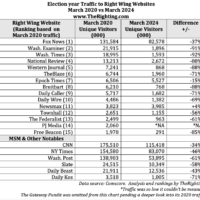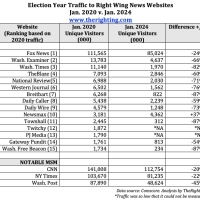
The Epoch Times: From Free Newspaper to Right Wing Power House
The Epoch Times is a newspaper and website that has become one of the fastest growing right-wing news outlets in the United States. (Photo: Wikimedia)
By Michael Lovito, September 21, 2022
What do The Epoch Times, a free, conspiracy-parroting newspaper and Shen Yun, the ubiquitously advertised Chinese performance arts show, have in common?
They’re both affiliated with Falun Gong, a fringe Chinese religious movement that, over the past two decades, has launched media organizations across the globe in an effort to bring attention to their persecution at the hands of the Chinese Communist Party. The most successful of these efforts has been The Epoch Times, a newspaper and website that devolved from a single-issue outlet to a sketchy click farm until, thanks to its embrace of the anti-China policies of former President Donald Trump, it became one of the fastest growing news outlets in the United States.
As part of our ongoing series about far right media outlets, The Righting reached out to The Epoch Times media request line, U.S. editor-in-chief Jasper Fakkert, and senior editor Jan Jekielek, to ask about the newspaper’s editorial strategy and rapid growth. We did not get a response. This wasn’t surprising – the insularity of The Epoch Times is part of its appeal. It helps the newspaper brand itself as an independent news source accountable to nothing but the truth. It also affords it a bit of a mystique which, in addition to its wide-reaching digital strategy and ability to keep up with conservative trends, may help explain some of its appeal.
This description of The Epoch Times is based on a wealth of previous reporting by Kevin Roose of The New York Times and Simon van Zuylen-Wood of The Atlantic, along with our own examination of the publication’s website.
Niche Beginnings
The Falun Gong movement, itself a spin-off of the qigong meditative movement, was founded in China by Li Hongzhi in 1992. The belief system caught on quickly in his home country and by 1999 had an estimated membership of 70 million people. The Chinese government began to crackdown on the group after it staged a number of anti-communist protests in the late 90s, imprisoning, torturing, and reportedly harvesting the organs of Falun Gong practitioners. In 2000, Falun Gong adherent John Tang founded The Epoch Times to publicize the group’s plight, a strategy that proved effective. Despite Falun Gong’s opposition to interracial marriage, homosexuality, and modern medicine, the sect managed to attract sympathy from both sides of the political aisle in the U.S., and has even inspired multiple bipartisan Congressional resolutions.
The newspaper, which is staffed nearly entirely by Falun Gong adherents and circulates in 36 different countries, operated as a niche concern for most of its first 15 years of existence but eventually branched out into more hard news coverage, and even won a few photography and design-related awards in 2014. But its emphasis on Falun Gong beliefs and anti-communist commentary failed to generate many subscribers, leading most issues to be distributed for free on street corners, in driveways, and in old fashioned newspaper boxes. According to the New York Times, by 2015 the paper was in dire financial straits thanks to changes to Facebook’s advertising algorithm, and a decision was made to deemphasize its political content and focus on viral clickbait stories to attract a wider audience.
Make the Epoch Times Great Again
The paper’s fortunes began to turn during the 2016 presidential election, when Donald Trump made opposition to China’s trade policies a key plank of his campaign platform. The Epoch Times recalibrated its editorial strategy to that of an outspokenly pro-Trump outlet, and in 2018 it hired Brendan Steinhauser, a Republican strategist, to help coordinate interviews with Trump Administration figures like Secretary of State Mike Pompeo, Secretary of Housing and Urban Development Ben Carson, and White House adviser Steve Bannon.
This uptick in political relevance also saw The Epoch Times embrace an aggressive new digital strategy. The newspaper and other Falun Gong-affiliated organizations set up Facebook pages with names like “America Daily” and “Patriots of America” that lured in subscribers with viral content and aggregated news stories before eventually shifting gears and linking to Epoch Times stories. Eventually this ethically blurry marketing practice compelled Facebook to ban the paper from advertising on its platform, but the gambit paid off. As of this writing, The Epoch Times currently has over 9 million followers on Facebook, more than other right-wing outlets like Breitbart, The Daily Caller, and The Daily Wire.
Coronavirus and Voter Fraud
The other world event that was a boon to The Epoch Times’ popularity was the Covid-19 pandemic, which made their anti-CCP position newly relevant to previously indifferent Americans. Having been banned from advertising on Facebook, The Epoch Times migrated most of their promotional efforts to YouTube, where they not only began running pre-video ads but also released “Tracking Down the Origins of the Wuhan Coronavirus,” one of the earliest documentaries to claim that Covid-19 was deliberately created and spread by the Chinese government. Uploaded by both the Epoch Times and the Falun Gong-affiliated TV station New Tang Dynasty, the video has attracted over five million views on YouTube combined. The Epoch Times hasn’t necessarily been able to convert those viewers into subscribers – their YouTube channel has only half a million followers – but they’ve released three other videos that have attracted at least one million viewers. Their most popular video, which shows vandals destroying the paper’s Hong Kong printing press, has been watched over 22 million times.
After the 2020 presidential election, The Epoch Times began promoting voter fraud conspiracy theories, releasing a YouTube interview with Trump lawyer Sidney Powell and writing glowing stories about the lead up to the January 6 Stop the Steal protest (Falun Gong founder Li Hongzhi even published a poem about the election in which he claims “Fraud and corruption are harming a great nation”). Once that protest became violent, The Epoch Times published columns speculating that the storming of the Capitol was a deep state engineered “false flag” and has since written a number of pieces sympathetic to January 6 defendants. In July 2022, The Epoch Times released a documentary titled “The Real Story of January 6,” which alleges that the riot was an “inside job” designed to discredit voter fraud allegations.
Since Joe Biden took office, The Epoch Times has glommed on to a number of conservative causes célèbre, creating a “special coverage” section devoted to “education, CRT, [and] family” and publishing unflattering stories about CDC director Rochelle Walensky and Anthony Fauci. The paper still has two verticals devoted to China and Hong Kong coverage and its op-ed writers, in addition to criticizing government spending and liberal universities, continue to take a hardline against the CCP.
Growing Fast
The Epoch Times touts itself as “America’s fastest-growing independent news media,” and they may be right. According to TheRighting’s metrics, The Epoch Times was the second most visited conservative website in July of 2022, and their readership has grown by 40 percent since July of 2021. If their mission statement is a genuine reflection of how they see themselves, they must consider this success as a step forward not only for their bottom line, but for humanity as a whole.
“We believe that we live in truly epochal times, where the faithful representation of our current events won’t just be important for the people of today, but also the generations of tomorrow,” it says. “The records we keep now will directly inform the foundations of the history they’ll learn and the values they’ll cherish – and this knowledge is what drives us.”
Michael Lovito is a Brooklyn-based reporter and critic whose work has appeared in Salon, Brooklyn Magazine, Pavement Pieces, and The District. He also serves as editor-in-chief of the politics and pop culture website The Postrider. @MLovito
Interested in more news about right-wing media curated especially for mainstream audiences? Subscribe to our free daily newsletter.
























